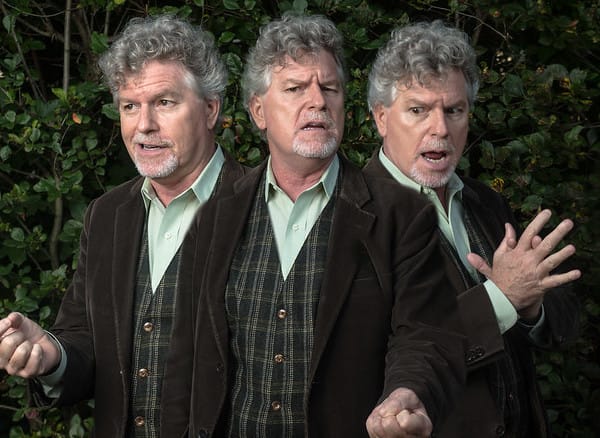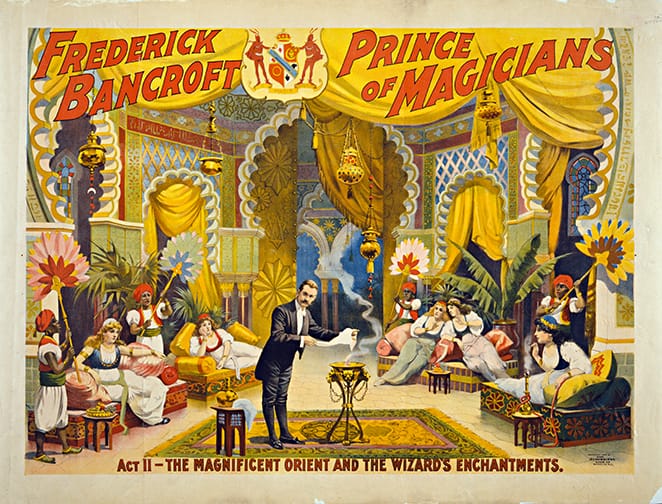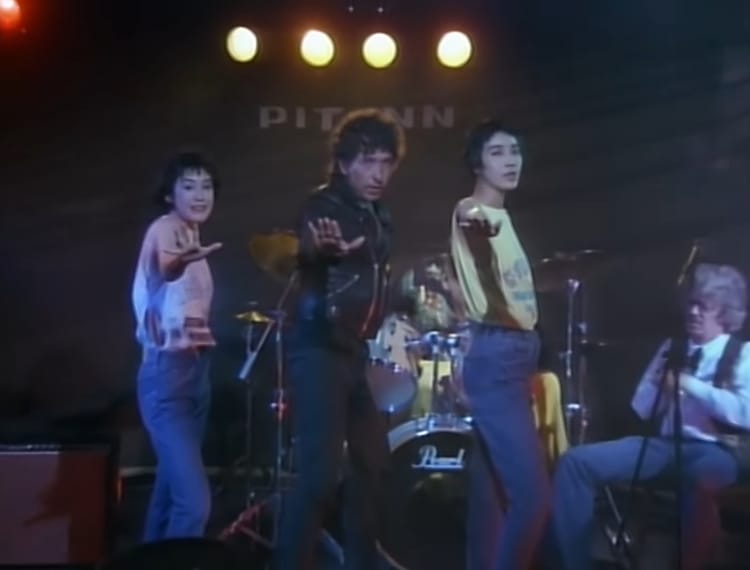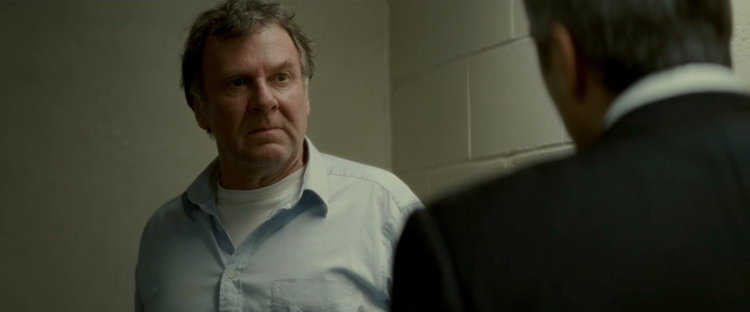“Irreverence is the greatest form of reverence”

Austin Tichenor followed me on Twitter a year ago after he shared an essay I wrote about The Muppet Christmas Carol, a piece which he flatteringly described as “a solid bit of scholarship” (I disagreed then, and still do, but I was touched all the same). I followed Austin back without much consideration—his seemed like an interesting enough account based on that vague knee-jerk decision where your thumb either taps “follow back” or doesn’t—but as he started to appear on my timeline in the following days and weeks, I realized something surprising: wait, this guy is Austin Tichenor!
Have you heard of the stage show The Complete Works of William Shakespeare (abridged)? How about the Reduced Shakespeare Company, who produced that play and a variety of other “abridgments” of topics from the Bible to US history? These shows are as Vaudevillian as they are brainy, and—pretty crucially—they are very, very funny. Austin is the co-artistic director of the Reduced Shakespeare Company, as well as the co-writer of many shows and books released under that banner, and host of their podcast (plus many non-RSC credits as a writer, actor, and more!). While it’s been a few years since I was immersed in the world of the RSC, there was a time when Austin’s work took up a decent amount of rental space in my head. So it was a belated thrill to realize we’d become Twitter mutuals.
Someone else might have reached out to say Hi. I, on the other hand, did absolutely nothing for a year. But finally I worked up the courage to drop Austin an e-mail out of the blue explaining much of the above, and asking whether he might be interested in speaking for the newsletter. Austin kindly took time away from preparing for his second year as alternate Scrooge for the annual production of A Christmas Carol at Chicago’s Goodman Theatre, and we talked about reducing great works, as well as Shakespeare, Mary Shelley, and Charles Dickens. After all that, I still felt like we’d barely scratched the surface of everything on which I could have picked his brain.
Note: This conversation has been lightly edited for clarity and length
I'll start by asking what it means to reduce something. You are not creating theatrical CliffsNotes, you are creating a reduction. So what is that?
What we're doing is creating something new off of the very bare bones gist of the topic that we're talking about. We frequently say that the plots of all of our scripts are the same: it's three idiots trying to tackle an entire subject over the course of a two-hour evening, not knowing that such a task is impossible. And it's our naïveté that is appealing. The fun we have is when the points of view amongst the three performers are so clear that you can imagine what the play would be if only one of them got his way. But it's the particular compromise, and the compromised stew of the three of their options in combat, that creates the comic engine of all of our scripts.
So you create these scripts, and then they are reinterpreted by other people all over the world. How much space do you build in for the actors to reinterpret? Or are you asking them to go by the letter on the page?
The original authors of The Complete Works of William Shakespeare (abridged)–of whom I am not one–give a lot of license to people to not only reinterpret but to rewrite. Reed Martin and I have written all the other Reduced Shakespeare Company shows, and we allow the freedom to update a reference, update genders, update races, make it applicable to whoever is performing. But we don't want people rewriting scenes, because we should always get the history right when we're not getting it wrong on purpose. If you're writing your own scenes, you should just write your own play. So the credit and/or blame can go to the original authors. And as an actor myself, I know there's an infinite amount of room for interpretation, even if you're just using the exact same lines the playwright has given you.
Last night, I was watching whatever version is on YouTube of the original production–well, it’s not the original production, because you are appearing in it!
Right.
And so much of the charm is in believing that this is happening off-the-cuff, in the moment, and you are you. That's such an interesting task to then ask an actor to do, to recreate that. Do you sympathize with that?
It's the task of any actor in any play. And it's a more important task in comedy–every actor has to take the words they are given and rehearse it well enough so it sounds like it's coming out of your face for the very first time. My wife is an improviser, a Second City alum and a teacher of improv at Northwestern–and at Second City, as it happens. We arrive at the middle–at the same spot but from different corners–where she and her colleagues are improvising a show off the top of their heads in the moment that wants to feel as if it were scripted, and we are performing a meticulously rehearsed and memorized script as if we're improvising it. And the greatest compliment we receive is people coming up to us in the lobby afterwards going, Oh my God, I was there the night that you made that up! And we went, Well, we do that every night. But okay, thank you.
And boy, I have seen it before, and still, I was tricked when you pull the third guy up out of the audience.1 It's so effective.
Is education one of your goals when you're putting together a show?
Only as a byproduct. Entertainment, and laughter, and diversion are our main goals. But we always think that the greatest comedy comes from the more serious performances, and sometimes the more serious topics. I've long said that in productions of Shakespeare's plays, most of Shakespeare's histories and tragedies are insufficiently comic, even though Shakespeare has put a lot of comedy into those plays, and productions of Shakespeare's comedies are insufficiently grounded in real human truth and pain. Sometimes comedy can be seen as a license to just be goofy for no reason. It's one of the largest traps that people who perform our scripts fall into, this feeling that, Oh my god, it's a comedy, we've got to be funny every single minute of every single line on every page. No, you don't. That just feels forced. What you need to commit to one thousand percent is the task: We've got to reduce the complete works, or the entire Bible, or all of American history, or all the great books into 90 minutes. This is a life-or-death, clock-ticking sort of thing. The more you commit to that, the funnier it will be. If it's just like, Oh, we're just gonna goof around for 90 minutes. Well, then it seems like you don't care. And if you don't care, then why should we care?
Terrific point. Now, I would love to talk about Shakespeare a little bit with someone who cares a lot about Shakespeare. So what was your gateway all those years ago?
My gateway, I finally realized, was Star Trek.
Wow.
Because in the original series–I'm a T.O.S. guy–they talked about Your earth poet, Shakespeare. And some of his lines were borrowed for titles of episodes. I think that's where I first became aware of him.2
But also, I was lucky enough to grow up in the San Francisco Bay Area, and go on field trips to American Conservatory Theater in San Francisco. And there, I saw productions of Julius Caesar, Macbeth, and Taming of the Shrew–starring Mark “Beastmaster” Singer as Petruchio. It's an incredibly stylized Commedia production, which you can find on YouTube. And so what I discovered is, Oh my god, Shakespeare is really, really funny–not just the lines, but in the physicality. And having seen Shakespeare be funny and meaningful and powerful onstage first, when I started reading him in whatever it was, middle school or high school, it didn't make any sense to me on the page. But I knew it could make sense to me, because I'd seen it make sense. So I was lucky to experience real Shakespeare in performance first, rather than as something assigned to me in school.
I would always watch a Shakespeare production while reading the script rather than just sit down and read the script, even if I need to study the actual text. I'll always have something going, just to hear it at the same time.
And whenever I read a Shakespeare play, I'm reading it out loud. I have to hear how it sounds, because it makes sense hearing it coming out of my face in a way that it doesn't when I'm just reading it off the page.
Is there a common misunderstanding or misapprehension about Shakespeare that you feel like you can clear up?
I don't know whether I can clear it up, but I think the common misconception is that he's impossible to understand. And that's not true. He's hard to understand sometimes, and it helps to be taught by a person who loves it, and is not forced to teach it as part of a larger curriculum that you have no interest in. I do think that looking at anything through a skeptical comic lens is a more valuable way of studying a topic. I think irreverence is the greatest form of reverence.
And maybe the other misconception–or the conception about Shakespeare that really needs to be underlined, maybe, is that Shakespeare wrote some crap! Some absolute crap that doesn't need to be performed anymore for all sorts of reasons. And it's important to realize that.
OK, so which are the crap ones?
Well, one man's crap, et cetera.
I want to know what your crap is.
My crap…I don't ever need to see The Merchant of Venice again, and not just for its depictions of antisemitism. It's just not funny. I think it’s tonally insupportable. I respect it. I respect that Shylock is as much of a jerk character as every other character. But Portia is a racist brat. She has that one great speech about the quality of mercy, but she's awful, because on the next page, later in the same scene, she's incredibly unmerciful to Shylock after just giving that big speech.
Some people think Taming of the Shrew is crap. I love Taming of the Shrew. I think problematic people deserve love as well, and I think Kate and Petruchio are very well matched, and they tame each other. So there.
Well, that kind of hits my next question, which was going to be: is there one that doesn't get a lot of love that you want to stick up for? So is that your answer?
Yeah, I'll stick up for Taming of the Shrew. I've done several podcast episodes with a director friend of mine, Shana Cooper, who has directed it several times, and she loves returning to it. In fact, the last time she returned to it, she went, I realized this time, it's really about a marriage, and it's about learning to navigate a relationship. Which I discovered when I watched the play, I don't know, 10 years ago, 15 years ago, with my wife, who's an improviser. And that whole scene about, I say it is the sun. No, it's the moon. No, it's the sun. No, right. It's the sun. That's a scene about game playing. That's a scene about improvisation and learning to play with each other. That's her observation, not mine.
As my son said, He doesn't feed her, Dad! He starves her! I'm not saying it's not complicated! But shrews deserve love, too.
If you are going into a new production of a Shakespeare play. Is there anything that you are hoping to see?
What I say when I'm directing his comedies–like when I directed Midsummer Night's Dream, or Twelfth Night–what I tell my actors is that I am not worried about this play being funny. We will make it funny, I have zero doubt about that. What I'm concerned about is that we make it real. I want the emotions to be valid and truthful and motivated and deep and rich. Because from that, the greater comedy will flow.
Similarly, if you asked what play am I looking to direct next? I would love to get my hands on Henry VI Part One, and maybe the entire Henry VI trilogy, because there is so much comedy in those plays that never comes out, or rarely comes out. 30 or 40 years ago, the BBC did the complete canon, and their Henry VI [Part] One is actually pretty funny. They lean into the stage directions. Even Shakespeare stage directions—or whichever editor wrote the stage directions—they're funny! Blue army comes on from the left. Red army comes on from the right. It's as if Armando Iannucci, who wrote Veep, and The Thick of It, and the Death of Stalin, wrote Henry VI. It's these brothers mourning the death of Henry V and going, I'm in charge! No, I'm in charge! No, I'm in charge! No, I'm in charge! Nobody can finish a sentence because they keep arguing. And nobody can finish a sentence because all these different messengers keep coming in saying, We're at war. These factions are coming. It's comic on its face in ways that never get brought out in production.
Do you like Slings & Arrows?3
I admire Slings & Arrows.
Oh no!
No, no, no! I say I admire it because I've not seen all of it. When I watched the first season-and-a-half, I was not that far removed from my own previous job as the associate producing director of American Stage Festival [now the Amato Center for the Performing Arts], a summer stock theater in southern New Hampshire, and it just hit too close to home. I need to rewatch it because what I loved about the season-and-a-half that I watched is that when they get down to recreating the artistic process, they really nail it. And their interpretations of the actual Shakespeare are right on. What bothered me was that the administrators of the festival were just too clownish. Having been an administrator, I took great umbrage. Maybe if I watched it again, I would feel less umbrage about that. But yes, I need to watch the rest of them now, from my more mature standpoint.
It’s just a show I could rewatch endlessly, so I had to ask.
I mean, that's the one of the greatest recommendations I can think of.
I would love to jump away from Shakespeare and ask you a little bit about Frankenstein, which you adapted for the stage. Of all the novels out there, why pick that one?
Because there wasn't a good adaptation. There were several good versions of Dracula. This was created back in my summer stock days, and we had done one version of Dracula–I don't think it was the one that Frank Langella had been in on Broadway, and that Edward Gorey had designed, and was so hot in the ‘70s, I think it was an older adaptation. But also, Dracula and Frankenstein are two very different books! Bram Stoker's novel, I think, still actually delivers what you expect from a horror novel. Mary Shelley's novel does not deliver on that score. It’s a novel of ideas, but it's not really a horror novel in any way. It's more of a science fiction novel, arguably the first. And so what I wanted to do was create an adaptation that married the ideas that she argues so persuasively and articulately in her novel with some of the things that you expect when you go to see a play called Frankenstein. In my head, that translated into marrying George Bernard Shaw, with his plays of ideas, with Stephen King. Reasonable viewers and readers can debate how successfully I did that, but it's been produced a number of times now since it's been published. I saw one of them, and I was really pleased with how it worked. It's verbose, and you need the soul of Shakespeare–you need actors who can handle language, because it is a play about language in and amongst the kidnappings and the onstage breaking of bones.
So what elements are you pulling from Stephen King?
Mostly just the plain old jumpscares when you can make them happen. The slimy, gross kinds of things that he likes to indulge in. But also just the violence. A neck is broken. A character is hanged. A corpse is desecrated. The reanimated creature comes to life in whatever way you and your production team can devise. The creature’s makeup is as gross as you can make it. I think that’s one of the thrills of the story, particularly to contemporary eyes, because it looks like Oh, this could be a very staid Merchant Ivory - holy crap, they're tearing this person's clothes off and building a new corpse out of the parts of several other corpses! That can't exist in the same story! And yet it does.
I think I saw on your website that you were also influenced by The Tempest for this. Is that right?
I was, because the book, like Shakespeare's play, starts at sea. And there's no greater way to open a play than with a storm at sea. Shakespeare knew it, he did it a couple of times. But also, I was really drawn to the idea that in Shelley's novel, the creature discovers, just by chance, these two books. One of them is The Sorrows of Young Werther by Goethe, which is not a text that we in America know that well. So I thought that one of the texts that the creature could be drawn to was Shakespeare's The Tempest, because he would identify with Caliban, a “hagseed,” another “beast”–in air quotes–that is disavowed and disowned by his–again in air quotes–“creator.” I thought the creature could find immense identification there in a way that the audience could really understand.4 So that's why I leaned into that, and I felt like I had got permission from the first reprint of Mary Shelley's novel, with an introduction written by her former husband, Percy Shelley–he mentioned Shakespeare, and how he thought his wife's novel was on a continuum that included Shakespeare. And so that felt like permission enough for me to incorporate more Shakespeare. Plus, you put Shakespeare into anything, it instantly lends a bit of credibility, and gravitas to whatever cheap entertainment you're trying to create.
I've done it. I've pulled that trick. Using The Tempest!5
Let's talk about Charles Dickens a little bit. Are you a Dickens lover writ large?
No, I'm a Dickens lover writ small. I've loved much of what I've read. Not all of it. He did tend to go on a bit. It's one of the great pleasures of A Christmas Carol, that it gets the laugh and it gets out, as we say in The Complete History of Comedy (abridged). But his observations, his characters–all of his characters can be interpreted in so many ways.
So how do you approach Scrooge in a fresh way when the character is presumably something the audience has seen interpreted so many times?
Such a great question, complicated by the fact that I don't have complete license, because I'm the alternate Scrooge to the actor, Larry Yando, who's now playing it for his 16th year. So I have to deliver the performance that's been rehearsed, and that the other actors onstage are expecting, and that some of the sound cues require, because they are timed in a certain way. So I don't have complete license, except for the fact that I'm a different actor than Larry. So just naturally, I'm going to do things differently. This is why I don't mind borrowing from other actors, because I can't steal it outright. Even when I do something the exact same way that he does, it's just different because I'm doing it. I can't recreate him, much as I wish I could. He gets some laughs that I don't get. I get a couple of laughs that he doesn't get. And that’s very encouraging. So in those moments where I have that little freedom, I try to give what I can.
One of the things that I took away in learning the role last year–and I'm not sure that this was emphasized by the director, or even pulled out by Larry–is that Scrooge is being shown not only what he did, but what other people did. He's seeing the world around him in a way that he did not see it when he was there. He's noticing other things that passed him by when he was living it. One of the longest speeches Scrooge has to give about a character that isn't himself is about Fezziwig. He comes to realize that the way that Fezziwig celebrated Christmas, and treated his workers, is the thing that [Scrooge] forgot, and the thing that he most embraces at the end. I had never really noticed that before in all my viewings or readings of it. And I have written parody versions of it for the Reduced Shakespeare Company, and I wrote a straight-ahead contemporary adaptation of it back at American Stage Festival in southern New Hampshire. And I set it in contemporary New Hampshire because there is no state in America that embraces the Scrooge ethos more than New Hampshire, whose state motto on the license plate is Live free or die–and decrease the surplus population! (I added that last bit.)
How scary should A Christmas Carol be?
Very.
Cool answer.
Why are we here if the ghosts aren't scary? I just saw a play that had a ghost throughout and didn't do anything with it. You've got a ghost on stage acting just like another character? What? Why are we even here then? Your ghost should be scary A.F., as the kids say! On the page, maybe it doesn't have to be quite as scary. But I would argue that Dickens wrote very scary ghosts, even on the page.
Do you have a favorite movie version of A Christmas Carol?
I'm torn between the Alastair Sim version from 1951–I think his performance is very dry, and very witty, and very moving. But I'm also drawn (and that's why it was so great to read your article celebrating The Muppet Christmas Carol) I'm very drawn to Michael Caine's performance. And, in fact, I think I draw more from his performance than Alastair Sim’s. Because he was so nakedly emotional in all of his scenes–when he's angry at Bob Cratchit and the rats, he's very angry. When he's taking delight in throwing them out onto the street, he takes enormous delight. When he's scared–when he says to the Ghost of Christmas Future, I fear you more than any specter I have seen–he looks terrified. And when he is moved by his transformation, or even by the loss of Belle, he's incredibly moved. I mean, he's a great actor. And it's more, I think, nakedly emotional than Alastair Sim. For me, as an actor, it helps to tap into that when you're playing it in an 800-seat theater and want to make sure everybody gets what's going on. Scrooge isn't the narrator of what's happening to him. He's the subject of what's happening, and so it's got to be happening to him on a pretty fundamental level. So those are my two favorites.
Learn more about Austin’s work at his website, The Shakespeareance.
In the beginning of The Complete Works of William Shakespeare (abridged), only two cast members appear onstage. After they poll the crowd and discover that one audience member is suspiciously familiar with Shakespeare, that “viewer” is revealed to be the third member of the ensemble. ↩
Austin wrote further on the connections between Shakespeare and Star Trek at the Folger Shakespeare Library. ↩
Slings & Arrows is a three-season TV comedy that follows the goings-on at a Canadian theater festival. It’s one of the greatest TV shows ever produced. ↩
Austin wrote further on the relationship between Frankenstein’s monster and Caliban at the Folger Shakespeare Library. ↩
Among other instances, I used the words to “Ariel’s Song” in my movie West of Her. ↩




